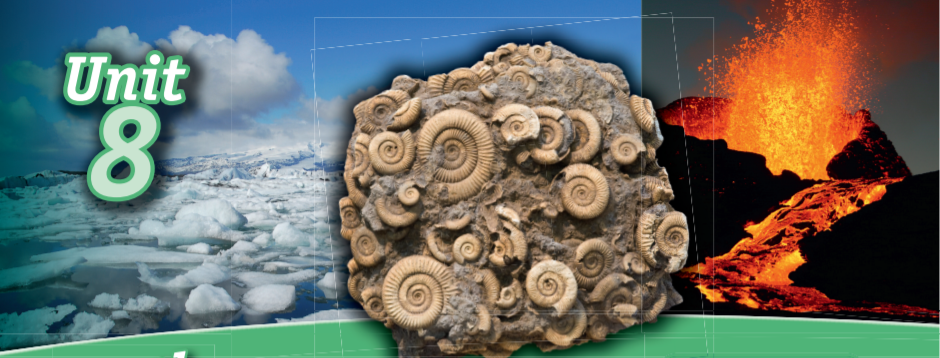Unit 8
Lesson 1
Student’s Book pages 62-63
Earth
Before reading
Look at the picture

1 What do the photographs show? Do you know what subject they all have in common? Discuss with a partner.
Answers
They show melting ice floes, fossils and volcanic eruption. These pictures are all related to the subject of geology and Earth.
The key words
|
The word / phrase |
The meaning |
The part of speech |
|
dramatic |
very sudden or noticeable |
Adjective |
|
ice age |
a time in the past when the temperature was very cold and glaciers (= large masses of ice) covered large parts of the earth |
Noun |
|
eruption |
the sudden explosion |
Noun |
|
asteroid |
one of many large rocks that circle the sun |
Noun |
|
rock |
the dry solid part of the earth's surface |
Noun |
|
fossil |
the shape of a bone, a shell, or a plant or animal that has been preserved in rock for a very long period |
Noun |
While reading
Earth’s climate story
Earth’s climate is changing, but this is not new. Over millions of years, Earth has experienced many dramatic climate changes. For example, several ice ages, when glaciers covered much of Earth’s surface, have taken place. In the past, Earth’s climate was affected by sudden disasters, such as huge volcanic eruptions and clashes with asteroids. These events filled the atmosphere with smoke and dust, which blocked out the Sun, causing the climate to become cold and dark. Many plants and animals probably died on these occasions.
Geologists, who study Earth’s rocks and how they formed, can ‘read’ layers of rock. These layers provide a record of what happened in the past. In warm periods of Earth’s history, there were many plants and animals which eventually died and were fossilised in layers of rock.
Archaeologists have also discovered evidence that shows how Earth’s climate has changed over millions of years. For example, they have found fossils of trees in parts of Antarctica, which prove that this area was much warmer 110 million years ago than it is today.
Humans, whose activities might be causing global warming today, need to take action. Otherwise there will probably be more extreme climate changes in the future. Nobody knows for sure what to expect. However, Earth, which has already survived some dramatic changes in its long history, may have to face some challenges in the future.
The text talks about:
- Glaciers that cover much of Earth’s surface during several ice ages.
- Disasters that caused the climate to become cold and dark.
- What geologists discover from the number of layers of rock.
- What archaeologists have found in Antarctica and what does this prove.
- There will probably be more extreme climate changes in the future.
After reading
- What may Earth have to face in the future?
- some challenges.